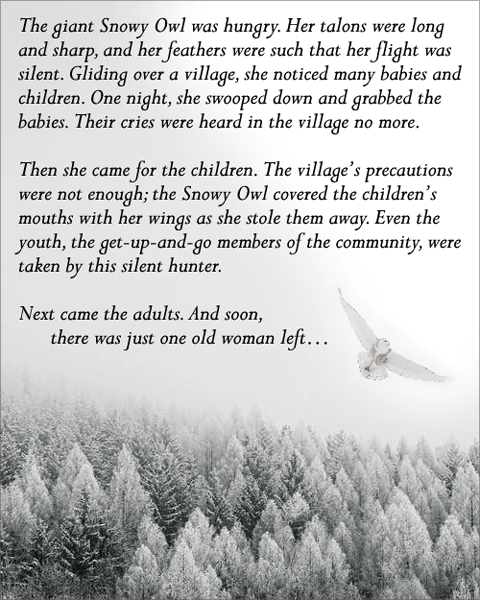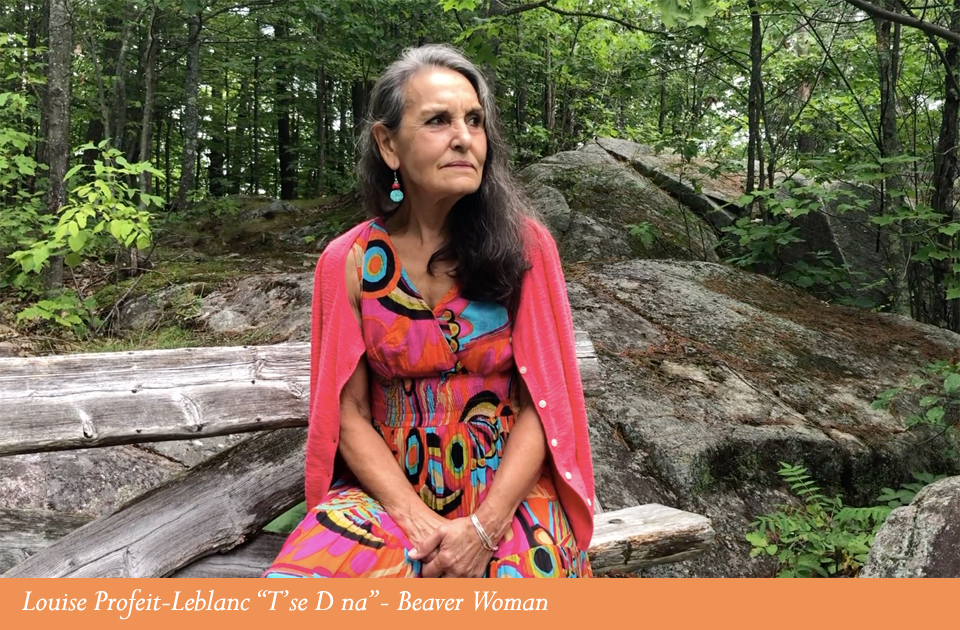|
 November
10, 2021
November
10, 2021
Truth and Reconciliation in Canada: An Elder’s Story
“Attach
great importance to the indigenous population of America. For these
souls may be likened unto the ancient inhabitants of the Arabian
Peninsula […] When the light of Muhammad shone forth in their
midst…they became so radiant as to illumine the world. Likewise, these
Indians, should they be educated and guided, there can be no doubt that
they will become so illumined as to enlighten the whole world.”
— ‘Abdu’l-Bahá
 In Louise
Profeit-LeBlanc’s re-telling of an old tale, it’s a grim
narrative that ends in hope. An unprepared village was lost, but the
wise, wily elder survives and shares her story with others to prevent
further tragedy. Ms. Profeit-LeBlanc, “Tsé Itzoh” (Beaver Woman), a
member of the Na-Cho Nyak Dun First Nation (Mayo, Yukon), used the
Snowy Owl story to end her presentation to a virtual audience of over
130 in a timely episode of the Ottawa Baháʼí community’s “Big
Ideas”
series.
In Louise
Profeit-LeBlanc’s re-telling of an old tale, it’s a grim
narrative that ends in hope. An unprepared village was lost, but the
wise, wily elder survives and shares her story with others to prevent
further tragedy. Ms. Profeit-LeBlanc, “Tsé Itzoh” (Beaver Woman), a
member of the Na-Cho Nyak Dun First Nation (Mayo, Yukon), used the
Snowy Owl story to end her presentation to a virtual audience of over
130 in a timely episode of the Ottawa Baháʼí community’s “Big
Ideas”
series.
For Louise – an artist, storyteller and grandmother – the story is
redemptive. The wise woman won. Balance was restored. After calamity,
the people vowed to destroy the beast that had swallowed up so many.
Canada finds itself at a similar turning point today, and the mounting
toll of lost Indigenous children and youth is on everyone’s mind these
days.
Louise first told her listeners of her Aunt Molly, one child lost to
the talons of the residential school system. One day her brothers
couldn’t find little Molly in the schoolyard. Some time later, they
learned that she had died – with parents uninformed, her gravesite
unknown, and her brother, only a child himself, burdened by guilt that
it was him who had let Molly down and not the adults in charge.
Canada’s Truth and Reconciliation Commission heard over 6,000 such
testimonies from Indigenous people “raised without their parents”. How
are they, and all of us, to go forward? In the words of TRC Chairman
Murray Sinclair, progress occurs “one mind at a time”.

Louise remarked that, as a Baháʼí, “we are urged to be truth-seekers”.
This quest for truth is often called the first principle of
Baháʼu'lláh, the Faith’s Prophet-Founder. He also called justice “the
best beloved of all things”, and made this profound declaration:
“The
light of men is Justice. Quench it not with the contrary winds of
oppression and tyranny. The purpose of justice is the appearance of
unity among men.”
All people have suffered, including many settlers who fled to these
shores. Whether our ancestors were uprooted from other continents or
have endured centuries of oppression while indigenous to this one,
Profeit-LeBlanc insisted, “Reconciliation is a mountain, and we all
need to climb it together.”
The TRC listed 94 recommendations, most addressed to individuals and
groups. The Canadian Baháʼí community acknowledges the painful truths
of residential schools and advocates an approach to justice that heals
and unites. Still, Louise asked, “When we have hate, how do we turn it
into joy? When we have anger, how do we turn it into love?”
Compelled by the discoveries of 215 graves near the former residential
school in Kamloops, Louise and her husband built a sacred fire – 215
stones, representing the lost children – were laid down in a radiating
star pattern, each to the beat of a drum. This is an example of the
power of ceremony.
In 2021, Baháʼís worldwide are commemorating 100 years since the 1921
passing of ʻAbdu'l-Bahá, Baháʼu'lláh’s son and the expounder of His
teachings. Louise has embarked on an artistic project with many
friends, creating a “coat of unity” reminiscent of the Persian cloaks
worn by ‘Abdu’l-Bahá, decorated with beadwork. Her gentle challenge to
her hearers was to dedicate acts of reconciliation, however small, to
His memory. ”
Snowy Owl’s defeat led to the resolve of communities downriver to
remember and learn from tragedy. Louise is galvanized, too, by the
astonishing promise of ‘Abdu’l-Bahá, that should the Native peoples of
North America “be educated and guided…they will become so illumined as
to enlighten the whole world.” Their resilience and growing strength
testify to what Baháʼu'lláh announced to the 19th-century world as
European colonialism and a cancerous materialism grew ever stronger:
“Know
thou, of a truth, these great oppressions that have befallen the world
are preparing it for the advent of the Most Great Justice.”
|
|


